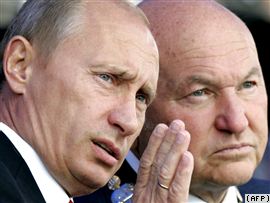Many of the commentaries that have appeared since the dismissal of Moscow Mayor Yury Luzhkov have stated the obvious: that politics have returned to Russia. Or, more to the point, political competition.
An internal conflict within the power structures created a situation in which a political heavyweight who was rejected by the Kremlin refused to play by the rules established by Vladimir Putin. Within the framework of that system, a commander who has thrived at the trough is forced to resign by threats of criminal investigations for crimes and violations that previously had been ignored. As a reward, the old goat gets a medal and the post of permanent adviser to the new goat or, in rare cases, a seat in the Federation Council.
But in the case, the old goat rebelled. Luzhkov showed some character and, having been ordered to get lost, was in no hurry to do so. What’s more, he decided to play on the clear contradictions between the bureaucratic clans that have rallied around, respectively, Dmitry Medvedev and Vladimir Putin.
And even now he seems prepared to continue the struggle even though it would seem the ruling duumvirate has reached a consensus about his fate. Incidentally, according to a source cited by the newspaper "Vedomosti," under the duumvirate’s rules, the right to choose a new mayor belongs to Putin.
In short, we see the appearance of a political heavyweight with significant financial resources who has fallen out of the Putinist system of power -- a heavyweight with an urge for revenge who is threatening to remain in politics.
But the rub is that the existing political system does not feature any real politics at all. Luzhkov can form a party and maybe even collect that required number of signatures to support that party. But the specially selected members of the Central Election Commission will never register it. They will make up the stupidest reasoning -- for instance, that the petitions were not filled out with the correct ink -- and refuse registration. And that decision will be obediently rubberstamped by the Constitutional Court.
And even if the impossible did occur and the party was registered, under the conditions of managed democracy and a situation in which the federal broadcasters can slander Luzhkov 24 hours a day, such a party would have no chance of success.
Putin not only ruthlessly stamped out any possibility for competitors to appear, but he also systematically destroyed the very instruments of democracy, such as a free press or the right to assembly and protest.
It is very significant that in the battle between the Kremlin and Luzhkov, both sides were forced to resort to the last remnants of a genuinely democratic system. The basis of the anti-Luzhkov films were taken form the report "Luzhkov. Results" that was written by one of the leaders of the "non-system" and persecuted opposition group Solidarity. The former mayor preferred to make his case to the city and the world through the magazine "The New Times," which is one of the very few uncensored print publications left in Russia.
Of course, some incurable optimists might think that as a result of this scandal we'll see the beginning of the restoration of democratic institutions. But I think another scenario is a lot more realistic. In the present system of power, a struggle between various clans (I won't bother calling it "political") looks different. A heavyweight with financial resources who is opposed to the authorities can expect only -- like former Yukos CEO Mikhail Khodorkovsky -- frozen assets, destroyed resources, and prison. And this is not out of bloodthirstiness, but simply because the Putin system does not have any other way to ensure its own victory.
Now we can expect the massive repression of Moscow bureaucrats, exactly like the repressions that were once visited upon the employees of Yukos. And during this, the president -- who initiated the attack on Luzhkov -- will have to constantly demonstrate his toughness within the framework of the logic of the Putinist system. For that, he will have to have his own -- Medvedevist -- siloviki.
I don't think that it is a coincidence that at this very moment the administration has submitted a bill to the Duma that would remove the Investigative Committee from the Prosecutor-General's Office and subordinate it directly to the president. At the same time, the head of the Investigative Committee, as far as can be determined, will not be a member of the government presidium (Putin's Politburo), as is, say, the interior minister. If the Interior Ministry and the Federal Security Service (FSB) maintain a sort of neutrality in the Luzhkov affair, then Medvedev will have the prosecutors of the Investigative Committee all prepared.
And that's how the Putinist system of power will be preserved. The "political" struggle to come will be waged, alas, in Moscow's notorious Butyrka remand prison.
Aleksandr Golts is deputy editor of "Yezhednevny zhurnal," where this commentary originally appeared. The views expressed in this commentary are the author's own and do not necessarily reflect those of RFE/RL





















